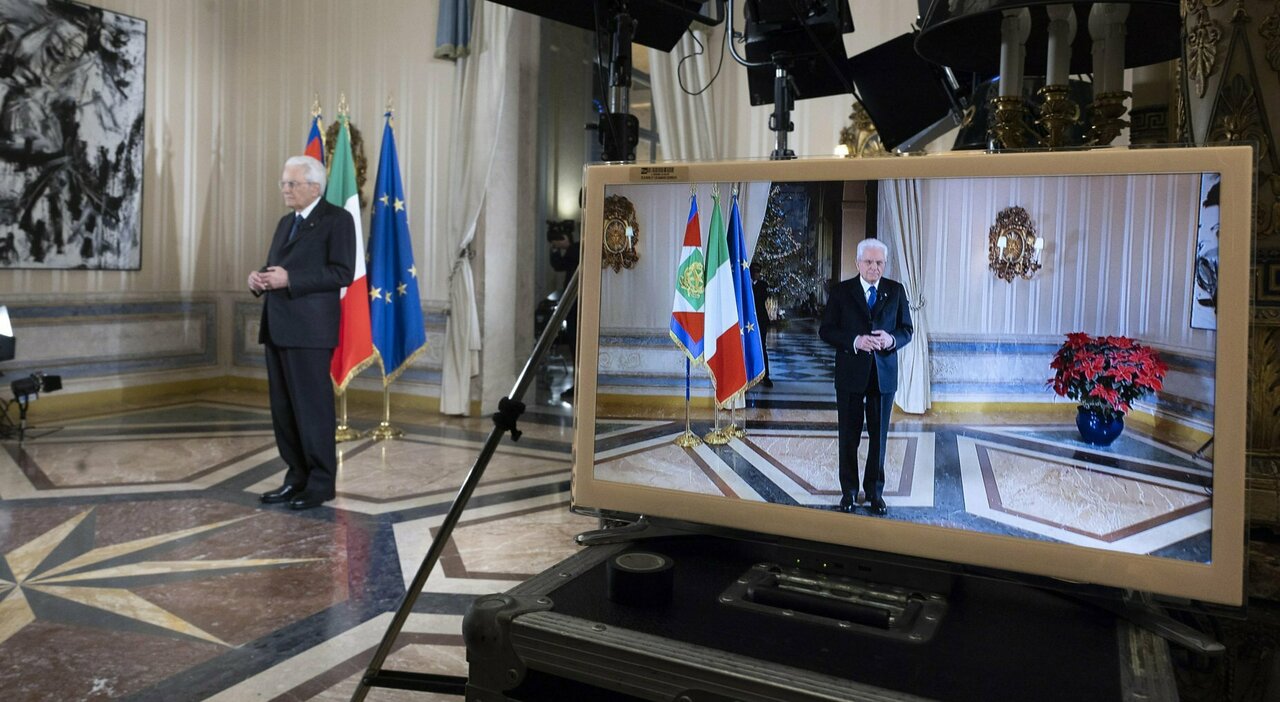«Peace» and «violence». «War» and «freedom». The most used words by Sergio Mattarella for his ninth end-of-year speech are a game of contrasts with which the Head of State, in an intervention that alternates bitterness and hope, underlines the contradictions that today affect the world, Italy and, above all, a society that in 2023 it has repeatedly given the impression of curling up on itself. «It is essential to make room for the culture of peace, it is not indifference or neutrality» he says.
THE STREET
The President then indicates the path which, in twelve months full of electoral events, also passes through “active participation in civil life”. «To define the path to follow, it is the free vote that decides. Don’t respond to a survey, or be on social media” underlines Mattarella who, as always, shows great attention to non-verbal communication. Standing and constantly rotating the ring on his ring finger, the Head of State takes a few steps towards “dear fellow citizens”. So much so that even the choice of the Tofanelli Room (already chosen in 2019) appears like a message within the message. If it is in fact true that the venue is located next to the Vetrata studio, the oldest nucleus of the Quirinale palace, it is also true that it is the room chosen by Mattarella to open its doors to Italians and to some works of contemporary art that testify to the tension towards the future of the Quirinale. And without pomp or lights of any kind, with only the Christmas tree in the background and looking for those 10 million and 647 thousand spectators in front of the TV (increasing compared to last year), for the future Mattarella as well as launching a new warning on the risks of artificial intelligence, he tries to disarticulate “the cult of conflict” which leads to violence, especially the “most hateful” kind towards women. «Dear guys – says the President – I tell you in simple words: love is not selfishness, domination, misunderstood pride. Love – real love – is much more than respect: it is gift, gratuitousness, sensitivity.”
Beyond the absence of direct references to the politics of our home, much less to the constitutional reform that would reduce the Colle’s powers, Mattarella hinges the highest meaning of the Republic and of hope in the word “unity”. «Unity not as a power that imposes itself, but as a way of being. To understand the national community. A state of mind, an attitude that unites because it is recognized in the founding values of our civilization: solidarity, freedom, equality, justice, peace.” The values of the Constitution, on which the national identity is based, witnessed «in the composed piety of the people of Cutro», «in the spontaneous gathering of many girls, after the terrible episodes of brutality against women», «in the industrious solidarity of the boys who shoveled the mud and sang “Romagna mia””, “in the smiles of the kids with autism who work enthusiastically at Pizza aut” or “of those who do it at Casal di Principe”.
DIFFICULTIES
A hope balanced by the large portions in which Mattarella insists on the difficulties of these times (for example “the lack of work”, “the underpaid one” or “not in line with one’s expectations and with the studies followed”), rich – precisely – of “violence”. «Between States, in society, in the streets, in the scenes of daily life», lists the Head of State. First of all, wars, “those in progress and those evoked and threatened”, which in addition to hatred and misery bring with them the risk “of getting used to this horror” and creating “a lost generation”, in which the tendency “to identify adversaries or even enemies”, sometimes used by those who speak to people.
Here too Mattarella draws the line by indicating the “culture of peace” (“Today it is not abstract do-goodism” but “the most urgent and concrete exercise of realism”) as the beacon with which to illuminate the darkest corners obscured by “forms of aggression” that mix true and false. On migrants (“we cannot turn our faces and look elsewhere”) as on frail people and the elderly (“worried about burdening their families, while the welfare system struggles to give them help”), or – with all due respect to some allusions too much for the “state protection money” – towards those who do their part. Doing so «means contributing, even fiscally».
Read the full article
on Il Messaggero
